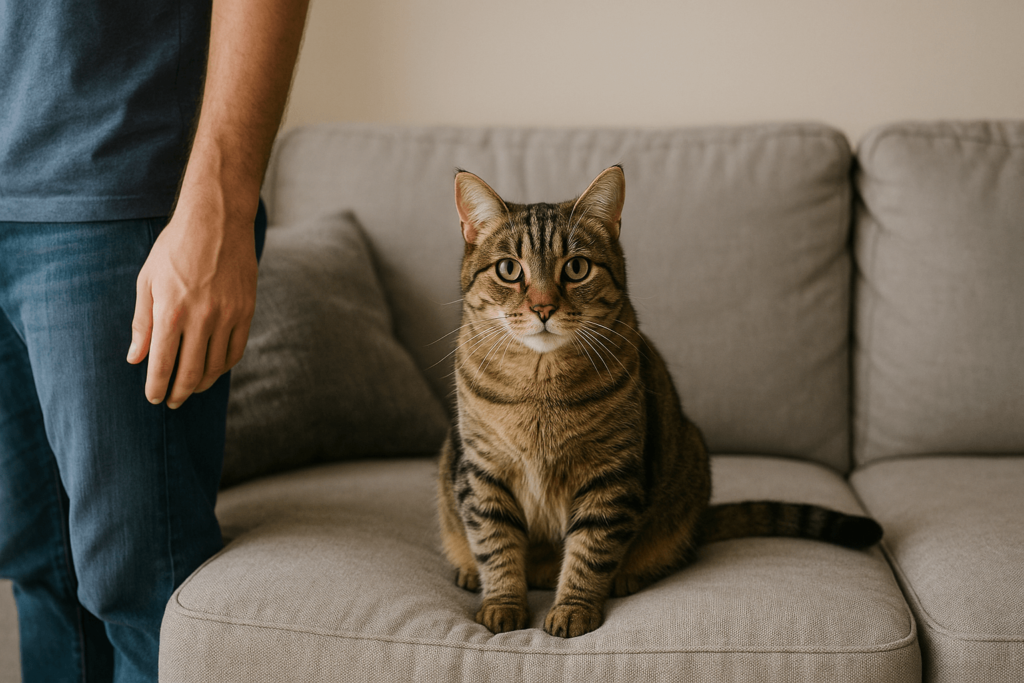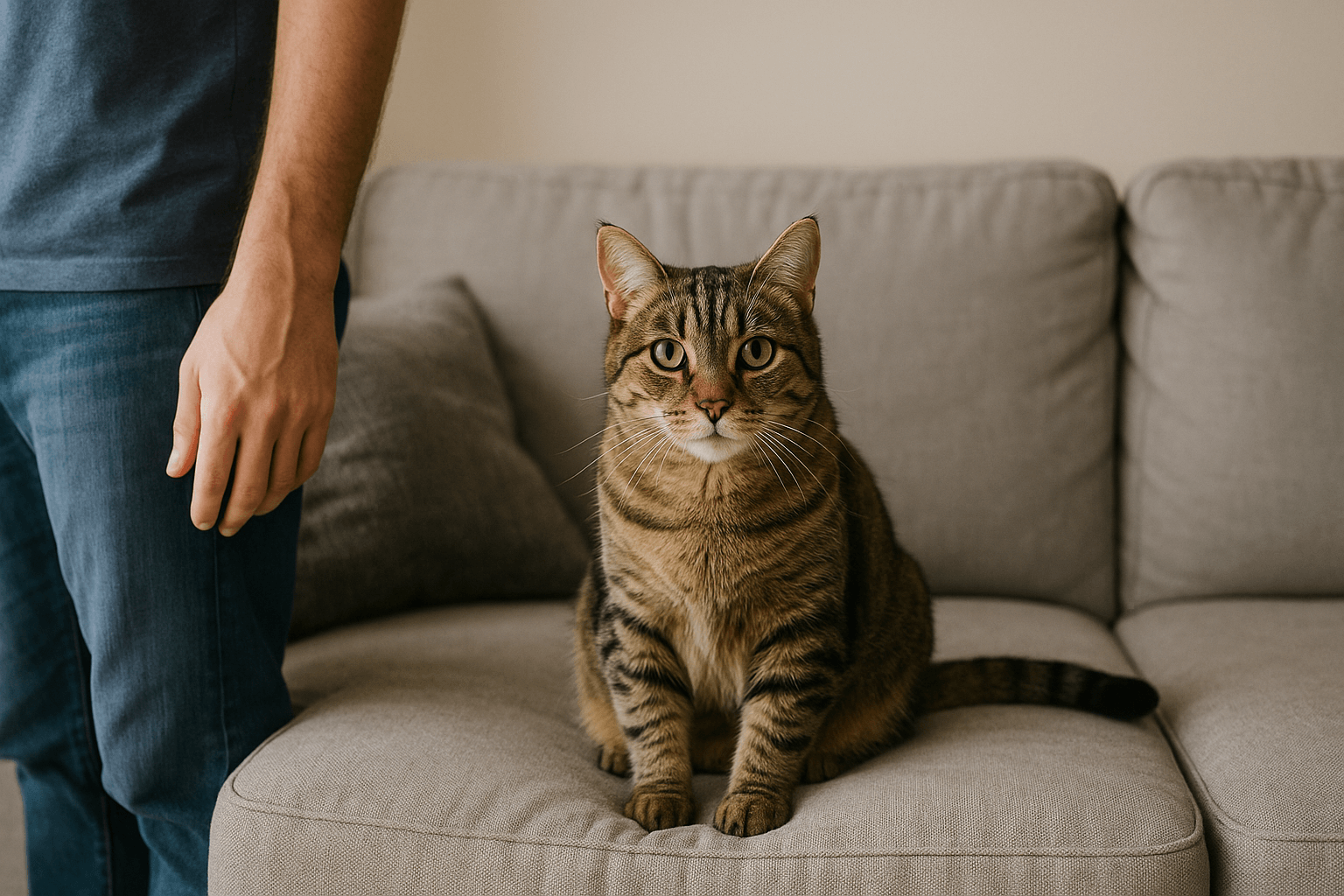Why Does My Cat Take My Spot?
Have you ever returned to your favorite chair or cozy spot on the couch, only to find your cat lounging there as if it’s their rightful throne? Cats have a knack for claiming spaces we consider “ours,” leaving us puzzled and sometimes amused. While this behavior might seem like a quirky feline quirk, it’s rooted in their instincts, preferences, and unique ways of bonding with their human companions. Understanding why your cat takes your spot can help strengthen your relationship and provide insights into their fascinating world. Let’s dive into the reasons behind this common yet endearing behavior.
Reasons Why Your Cat Takes Your Spot
Cats are territorial creatures by nature, and their decision to occupy your favorite spot often stems from instinctual behaviors and emotional connections. Here are some key reasons why your cat might be drawn to your personal space.
Warmth and Comfort:
Cats love warmth, and your spot retains your body heat, making it irresistibly cozy for them.Scent Marking:
By sitting where you’ve been, your cat is surrounded by your scent, which provides them with a sense of security and familiarity.Territorial Instincts:
Cats view their home as their territory, and they may see your spot as an extension of their domain to claim.Bonding Behavior:
Taking your spot can be a way for your cat to feel closer to you, reinforcing their connection to their favorite human.Curiosity and Exploration:
Cats are naturally curious and may simply want to explore areas that smell like you or feel inviting.
These reasons highlight how your cat’s actions are driven by a mix of practical needs and emotional attachment, making their behavior both logical and lovable.

How to Encourage Your Cat to Share Space
If your cat’s habit of taking your spot becomes inconvenient, there are gentle ways to encourage sharing without disrupting their comfort or bond with you. Here are some strategies to try.
Provide Alternative Warm Spots:
Place heated pet mats or soft blankets in nearby areas to give your cat an equally appealing alternative.Use Positive Reinforcement:
Reward your cat with treats or praise when they choose their own bed or designated area instead of your spot.Create a Cozy Cat Zone:
Set up a dedicated space with plush bedding, toys, and scratching posts to make it more enticing than your chair or couch.Redirect Their Attention:
Gently guide your cat to another spot and engage them with playtime or affection to distract them from your preferred area.Establish Boundaries Gradually:
Use consistent but patient training methods to teach your cat which areas are off-limits without causing stress.
By implementing these tips, you can maintain harmony while ensuring your cat feels content and secure in their surroundings.
Check this guide 👉Understanding Sick Cat Positions: Best 7 Health Tips!
Check this guide 👉Cat Sitting Positions Meaning: Best 7 Expert Tips!
Check this guide 👉Cat Whiskers Position Meaning: Best 7 Expert Tips!
Why Cats Take Your Spot | How to Respond Effectively |
|---|---|
They seek warmth | Provide heated pet mats or blankets |
They’re drawn to your scent | Offer items with your scent elsewhere |
They feel territorial | Create a dedicated space for them |
They want to bond with you | Spend quality time together daily |
They’re exploring their environment | Redirect their curiosity with toys |
The Emotional Connection Behind This Behavior
Your cat’s tendency to take your spot isn’t just about physical comfort—it’s also deeply tied to their emotional connection with you. These insights reveal the heartwarming side of their actions.
Seeking Reassurance:
Cats often gravitate toward places associated with their owners because they find comfort in their presence, even indirectly.Expressing Affection:
By occupying your spot, your cat may be expressing their love and desire to be close to you in a uniquely feline way.Mimicking Your Habits:
Cats are observant and may mimic your routines, including sitting in spots where they’ve seen you relax.Feeling Safe:
Your scent acts as a calming anchor for your cat, helping them feel protected in potentially stressful situations.Claiming Ownership:
Taking your spot can also signify trust, as they feel confident enough to share their territory with you.
Understanding these emotional layers deepens your appreciation for your cat’s quirks and strengthens your bond.
Common Misunderstandings About This Behavior
While it’s tempting to interpret your cat’s actions through a human lens, certain misconceptions can lead to confusion. Clearing these up fosters better communication between you and your feline friend.
“My Cat Is Being Spiteful”:
Cats don’t act out of spite—they’re simply following their instincts and seeking comfort.“They’re Trying to Dominate Me”:
Claiming your spot isn’t about dominance; it’s about forming a connection and feeling safe.“They Don’t Respect My Space”:
Cats don’t understand human concepts of ownership—they see shared spaces as part of their environment.“It’s Just a Phase”:
This behavior isn’t temporary; it reflects your cat’s ongoing need for warmth, security, and companionship.“I Should Punish Them for It”:
Punishment can damage trust—instead, focus on positive reinforcement and redirection.
Clarifying these misunderstandings ensures you respond to your cat’s behavior with empathy and patience.
Signs Your Cat Feels Secure in Their Environment
A happy and secure cat is more likely to exhibit behaviors like taking your spot. Look for these signs that indicate your cat feels at ease in their home.
Relaxed Body Language:
A calm posture with half-closed eyes and slow blinks shows your cat feels safe.Regular Napping in Shared Spaces:
Cats who nap openly in family areas trust their surroundings and the people in them.Purring and Kneading:
These behaviors signal contentment and a strong emotional connection to their environment.Exploring Without Fear:
A confident cat will explore new objects or changes in the home without hesitation.Playing Actively:
Engaging in playful activities demonstrates a sense of security and joy.
When your cat displays these signs, it confirms they view your home—and your spot—as a sanctuary.
How to Strengthen Your Bond Through Shared Spaces
Sharing spaces with your cat can enhance your relationship and foster mutual trust. Here are some ideas to deepen your connection.
Invite Them to Join You:
Make room for your cat when you settle down, allowing them to share the experience willingly.Engage in Interactive Play:
Use toys or laser pointers to play near your favorite spots, creating positive associations.Offer Gentle Petting:
Stroke your cat softly while they’re near you to reinforce feelings of safety and affection.Talk to Your Cat Calmly:
Speaking in soothing tones helps build rapport and reassures them of your presence.Respect Their Preferences:
Observe which spots they favor and incorporate those into your shared routine.
These gestures nurture a stronger bond, making your shared spaces even more special.
Addressing Behavioral Changes Related to Spot-Taking
Sometimes, changes in your cat’s behavior around taking your spot can signal something amiss. Keep an eye out for these potential triggers.
Increased Clinginess:
If your cat suddenly becomes overly attached to your spot, it could indicate loneliness or anxiety.Aggression Toward Others:
Guarding your spot aggressively might suggest discomfort or territorial stress.Avoidance of Usual Areas:
Refusing to use previously favored spots could point to pain or illness.Excessive Scratching or Marking:
This behavior might reflect heightened territorial instincts or medical concerns.Lethargy or Withdrawal:
A sudden lack of interest in shared spaces could signal depression or health issues.
Monitoring these changes ensures you address any underlying problems promptly, keeping your cat happy and healthy.
Frequently Asked Questions About Cats Taking Your Spot
Why does my cat always sit where I was sitting?
Your cat is drawn to your scent and the warmth left behind, which makes your spot comforting and familiar.
Is it okay to move my cat when they take my spot?
Yes, gently moving them to another cozy area is fine, especially if you redirect their attention with toys or affection.
Does this behavior mean my cat loves me?
Absolutely! Taking your spot is often a sign of affection and trust.
What if I don’t want my cat to take my spot?
Providing alternative warm and inviting spaces can help redirect their preference.
Can this behavior indicate stress or anxiety?
Sometimes, yes. If your cat suddenly starts claiming your spot excessively, consult your vet to rule out underlying issues.
Embracing Your Cat’s Quirky Habits
While having your cat take your spot might occasionally disrupt your plans, it’s ultimately a testament to the strong bond you share. Whether driven by warmth, scent, or affection, this behavior showcases your cat’s unique way of connecting with you. By understanding their motivations and responding with kindness, you can create a harmonious living environment that accommodates both your needs. So, the next time your feline companion claims your favorite chair, remember—it’s not just a spot; it’s a gesture of love and trust.
Canned Pumpkin for Cat Diarrhea: Best 7 Expert Tips! Natural remedy to firm stools, soothe upset bellies, and support gut health safely.
Can a Cat Give You Scabies? Best 7 Expert Tips! Discover the truth about feline mites, human skin risks, and how to protect yourself—without panic.
Cat Flea vs Human Flea: Best 7 Expert Tips! Discover the truth about bites, species, and how to eliminate infestations for good.
Weird Cat Behaviors: Best 7 Expert Tips! Discover why cats do strange things—and how to understand, not punish, their instincts for a happier home.





